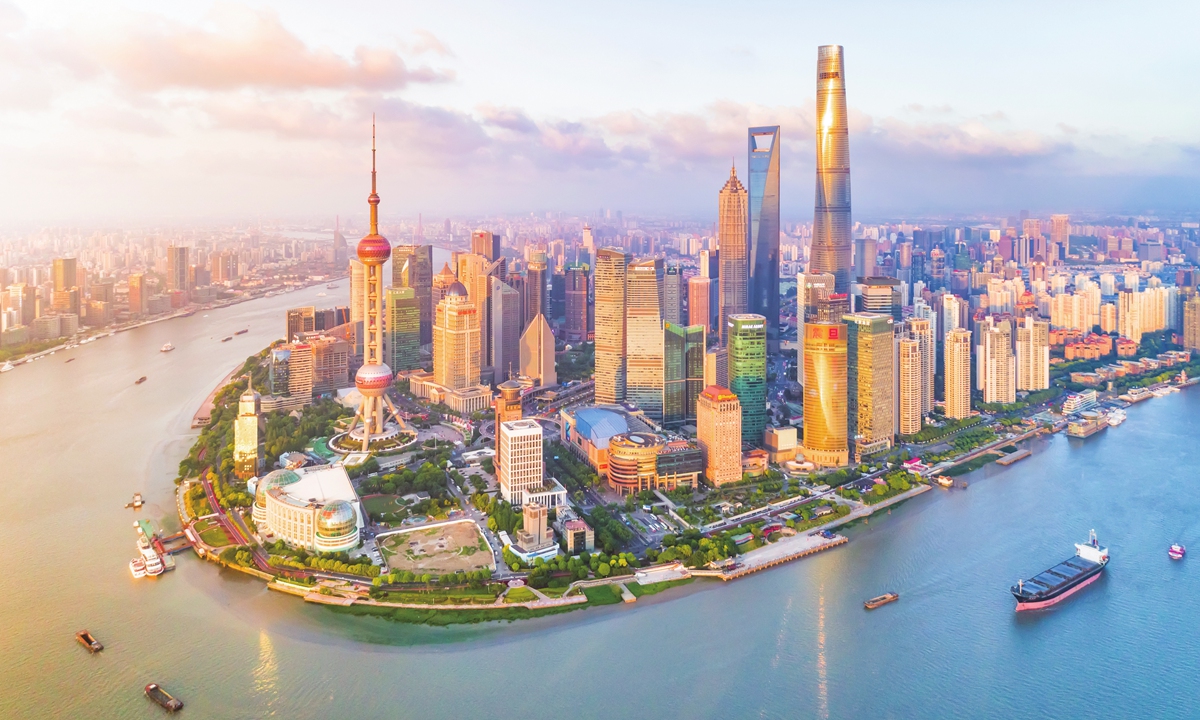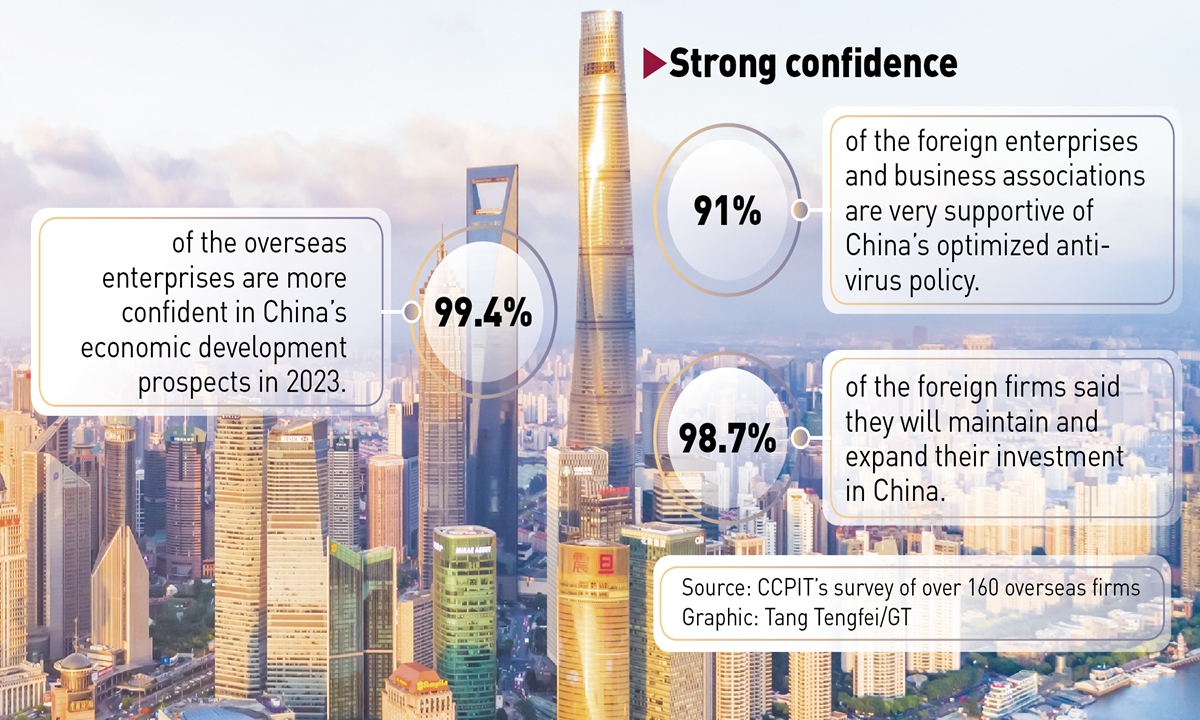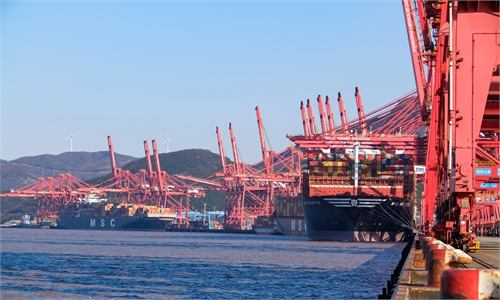Overseas companies give thumbs up to China's reopening policy, share optimism over 2023 growth


A view of Shanghai Photo: VCG
Editor's Note:
China has downgraded its COVID-19 management from a Class A to Class B infectious disease, and reopened its borders. In recent interviews with the Global Times, a number of overseas companies expressed their confidence in further deepening business ties with the country in 2023, as they stated the optimized anti-epidemic measures give good reason for them to be more positive that 2023 will see strong recovery for the country.
This is the second installment in a series on how China's optimization of its anti-COVID strategy is expected to help secure the future and brighten outlooks in the world's second largest economy.
As China reopens its borders and bids farewell to stringent COVID management and prevention measures, positive signs are being seen everywhere from surging stock markets to rebounding international tourism that all point toward the prospect of the Chinese economy opening a new chapter in 2023.
At the beginning of a year when such a prospect was gaining more and more recognition from business circles, multiple overseas companies told the Global Times that their confidence in the Chinese market has been further boosted after the implementation of the new COVID measures, while a number of them took the measures as a sign to further deepen business ties with the country by announcing new investment or business moves.
China's economy has forged ahead over the last three years amid its fight against the COVID-19, with sizable rebounds at times, and despite challenges and pressures brought about by the epidemic.
In December 2022, China announced it would reopen borders and abandon quarantine measures, marking an end to three years of COVID restrictions.
Thumbs up to reopening
After the new measures were implemented, companies globally welcomed the move. Many overseas companies' senior executives plan to waste no time in carrying out a personal visit to China soon after the reopening.
To date, around five multinationals have informed Global Times of such plans, including Jaguar Land Rover and the Mercedes-Benz Group.
In a recent interview, several overseas companies with businesses in China said that they thought the optimizing of COVID control measures would bring benefits.
Travel convenience is mentioned mostly by multinationals, as they said that the lifting of cross-border travel restrictions would make employees able to travel to and from China again, which facilitates communication between employees in different countries.
"The cancellation of cross-provincial travel restrictions has provided great convenience for our daily travel operation and local team communication. The optimization of epidemic prevention policy has also made our various commercial cooperation and offline activities smoother," Han Jingjing, a sales and marketing vice president of the Swiss air quality technology company IQAir China, told the Global Times.
The company's CEO Frank Hammes is also planning a visit to China soon, Han said. "The optimizing of the COVID policy has boosted our confidence for the future and enriched our anticipation for 2023."
For companies in certain sectors, the beneficial impact of China's border reopening is quickly showing in their business sector. Aviation is one such example.
Julian MacCormac, Country Director for Rolls-Royce, Greater China, told the Global Times in a written statement that after the Chinese government lifted its restrictive COVID policies in December, they saw an "immediate" boost of air traffic in China.
"Overall in the market, the December domestic flight volume is already 50 percent higher than the previous month, while international passenger flights saw a 70 percent year-on-year increase in the latter half of December," MacCormac said.
Several companies also mentioned that the optimization of COVID policies has made supply chains more secure, now that restrictions on cross-regional travel have been eased.
MacCormac told the Global Times that Rolls-Royce has cultivated an extensive network of suppliers across China as an essential part of their global supply chain."The change of the policy gives us more certainty in our operations and supply chain, and the policy adjustment will bring much more predictability in our operations globally," he said.
Edward Zhou, China President of US-based life sciences firm Cytiva, also noted that the optimized COVID-19 rules will help the company secure better supply chains and respond to local customer needs quicker.

Confidence in economy
Given the global economic slowdown and China's COVID resurgence in 2022, some overseas media sources have questioned the health of China's economy by pointing out problems like China's COVID infections rising in recent weeks and that overseas capital being withdrawn from China.
Such fears are unfounded, considering that a number of overseas companies announced plans to newly invest in China recently, while their executives also made very optimistic remarks about China's economic prospects for this year when interviewed.
To name a few of such investments: ABB opened a new 67,000-square-meter robotics factory in Shanghai near the end of 2022; Rolls-Royce established a new 50/50 joint venture with Air China in September 2022; Cytiva announced an investment of $8 million to expand their Fast Trak center in China, while McDonald's also opened 800 new restaurants in China in 2022 and is planning to open more in 2023.
It's not difficult to perceive overseas companies' continued interest in the Chinese market despite recent fluctuations, as some executives said that they have been impressed by China's ability to keep economic growth stable.
"Even in the face of the global pandemic situation in the last three years, China has managed to maintain an average annual economic growth rate of about 4.5 percent to minimize the impact of the COVID. With the optimization of epidemic prevention policy, we certainly have confidence that China's market demands will be better in 2023 compared with 2022, " AkihiroFukaishi, Chairman and president of Epson China, told the Global Times.
He also said that the positive factors seen in the Chinese market, including a changing development environment, various open economic policies, and the dual carbon goals, all provide a clear direction and opportunities for overseas companies to tap into the Chinese market.
Cytiva's Edward Zhou also predicted that China will witness substantial economic growth in 2023 as the country enters a post-pandemic era. In particular, China's biopharma industry is ready for another round of high-quality development after spending a year faced with tough challenges due to travel and economic restrictions.
"As the business environment is constantly optimized here, global investors are confident about its further growth and influence," Zhou said.
Wang Lei, Global Executive Vice President of AstraZeneca, said that the company is optimistic about China's high-quality development and the ability of China's manufacturing and supply chains.
"It's not easy for China to balance development and safety under the premise of controlling COVID. We also deeply feel that China's attitude toward opening up has never changed," Wang said.
A research center under the Hong Kong-based Fung Group published a report recently predicting that China's personnel and flow economic activities will hopefully resume nearing pre-COVID levels at the end of Q1 2023. The report also predicted that China's GDP will grow 5 percent this year, while consumer goods retail sales will grow 6-7 percent.
Dong Shaopeng, a senior research fellow at the Chongyang Institute for Financial Studies at the Renmin University of China, told the Global Times that the economic rebound will take off in the second quarter this year, saying that tourism will usher in retaliatory consumption in the next half year, in turn boosting relevant industries like catering and consumption.
Overseas capital inflow
Experts said that overseas capital will continue to flow into China, though decisions will differ from industry to industry.
Yue Xiangyu, a research fellow at the Institute for the Development of Chinese Economic Thought under the Shanghai University of Finance and Economics, said that new energy, new materials, medicine, and precise chemicals should be among the areas that overseas investors will favor in China.
But for areas like semiconductor facing increasing sanctions from the US government, foreign investment would decrease.
There are multiple advantages within the Chinese market that would strengthen the country's appeal to overseas investors. For one, China's role in the global supply chain is unshaken and not to be replaced easily in the next decade. Also, China's stable political environment provides solid support for overseas investment.
According to Cytiva's Global Biopharma Resilience Index, China shows its strength in several areas including manufacturing agility and supply chain resilience. That aside, Chinese companies are more passionate about investing in technological innovation. All these factors lay the foundation for the market's long-term growth.

